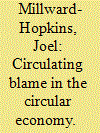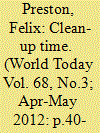| Srl | Item |
| 1 |
ID:
166521


|
|
|
|
|
| Summary/Abstract |
The transition from coal-based electricity to ‘carbon neutral’ biofuels derived from forests has catalysed a debate largely centred upon whether woody-biofuels drive deforestation. Consequently, a crucial point is often missed. Most wood pellets used in electricity production are derived from waste-wood; a practice considered acceptable by many otherwise strongly opposed to the industry. We highlight that, precisely because waste-wood is a ‘waste’, its carbon-neutral credentials should be questioned. We then examine a parallel development occurring within the same industrial system; the recovery of electricity producers’ combustion-ash residues for concrete production. Contrasting how accounting practices allocate upstream carbon to these ‘wastes’ in the cases of wood pellets and coal-ash reveals how decisions are shaped by industry imperatives, rather than established lifecycle techniques. If the politics of emissions allocation continue to evolve in this way, it may become increasingly difficult to distinguish where progress towards a low-carbon, environmentally sustainable and circular economy is real, from where it is an artefact of biased and inconsistent accounting practices.
|
|
|
|
|
|
|
|
|
|
|
|
|
|
|
|
| 2 |
ID:
123244


|
|
|
| 3 |
ID:
176842


|
|
|
|
|
| Summary/Abstract |
Energy sector policies have focused historically on the planning, design and construction of energy infrastructures, while typically overlooking the processes required for the management of their end-of-life, and particularly their decommissioning. However, decommissioning of existing and future energy infrastructures is constrained by a plethora of technical, economic, social and environmental challenges that must be understood and addressed if such infrastructures are to make a net-positive contribution over their whole life. Here, we introduce the magnitude and variety of these challenges to raise awareness and stimulate debate on the development of reasonable policies for current and future decommissioning projects. Focusing on power plants, the paper provides the foundations for the interdisciplinary thinking required to deliver an integrated decommissioning policy that incorporates circular economy principles to maximise value throughout the lifecycle of energy infrastructures. We conclude by suggesting new research paths that will promote more sustainable management of energy infrastructures at the end of their life.
|
|
|
|
|
|
|
|
|
|
|
|
|
|
|
|
| 4 |
ID:
062042


|
|
|
|
|
| Publication |
Mar-Apr 2005.
|
|
|
|
|
|
|
|
|
|
|
|
|
|
|
|
| 5 |
ID:
169846


|
|
|
|
|
| Summary/Abstract |
By conducting a meta-analysis of the empirical literature on the net employment effects of renewable energy, we explore the extent to which the reported net employment effects are driven by the applied methodology. We find that the reported conclusions on net employment effects are to a large extent driven by the methodology that is applied, where computable general equilibrium (CGE) and I/O methods that include induced effects and studies that consider only the near future in their study period (up to 2020) are generally less optimistic about net employment creation in the wake of the energy transition. In addition, we found that policy reports have a greater tendency to report a positive net employment effect than academic studies.
|
|
|
|
|
|
|
|
|
|
|
|
|
|
|
|
| 6 |
ID:
176714


|
|
|
|
|
| Summary/Abstract |
Existing energy infrastructure have a technical and/or economic lifecycle predetermined by the lifetime of certain components. In energy infrastructure, the residual lifetime of civil structure or other components with a longer life is usually wasted. Modular energy infrastructure can be reconfigurable decoupling the life of the infrastructure from their modules, and extending module and/or infrastructure lifecycle. Modularisation could become a cornerstone to enable circular economy (CE) and enhanced sustainability. Remarkably, despite the growing interest among policymakers, practitioners and academics in both CE and modularisation, there is a lack of knowledge about the link between CE and modularisation in energy infrastructure. Through a Systematic Literature Review, this paper derives the gap in knowledge regarding the link between CE and modularisation in energy infrastructure. This link is then investigated in other sectors identifying relevant implications such as reduction of construction waste and achievement of the closed-loop material cycle. Furthermore, the case of Yamal Liquefied Natural Gas project is used to compare and contrast two perspectives: “Traditional modularisation” and “Modular CE”. Lastly, the paper discusses existing policies, provides policy recommendations to foster “Modular CE” in energy infrastructure and suggests a research agenda.
|
|
|
|
|
|
|
|
|
|
|
|
|
|
|
|